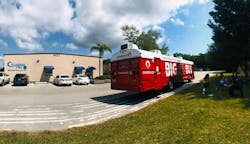Dealer Prioritizes Employees' Mental Health
There have been plenty of critics of how Florida leaders have managed the COVID-19 crisis in that state. Don Mead, CEO of Callaghan Tire Inc. in Bradenton, Fla., isn’t focused on that. He’s got his own daily punch list of worries.
“I try to stay focused on what decisions have been made and how is that going to impact my business and the people who work for us? How do we operate with the legal requirement of the restrictions and the spirit of the restrictions and ensure long-term business?”
For Mead, it boils down to three key points. Employee health. “I think about the health and safety of the employees and their families. We have to do everything we can to ensure their health and safety. And it’s not just the physical safety, it’s their mental health. It’s a big strain on their emotional health, too. They spend a lot of time in lockdown and a lot of time watching TV, which is exactly the wrong thing to do.”
He says he must remind the team that “this is going to end.
“We are in the coronavirus business right now, but we had a lot of momentum going into this. We had a tremendous first quarter. This will impact us, but it will end. We have to tell ourselves this and our people.”
Customer service. “We’re an essential business and most of our customers are essential busineses,” Mead says. “We have to maintain customer readiness. We have to understand that every one of our customers has a different criteria for how we’re supposed to engage their site.”
Future of the business. “Our job is to make sure we maintain business continuity. We have to come out financially strong,” Mead says.
“Unfortunately, we have to do all three.”
Status report
Mead says even though the governor of Florida didn’t order a statewide lockdown until the start of April, certain counties had imposed their own shelter-in-place orders before that. And business with local customers in those counties declined in the second half of March, thought it then started to pick back up.
After the governor’s order, Mead says it was “a mixture of decreased activity, but we also saw customers make big moves to stock up as well because they didn’t know what was going on.”
A couple of customers wanted to stock up. Mead says it wasn’t pervasive, so Callaghan Tire coordinated with the tire supplier to fulfill those orders. “I’m not anxious to just pull business ahead. At the same time we want to be responsive to the fleet if their strategy is to pull supply.”
He said some wanted to pre-buy a month’s supply of tires. “Normally we’d deliver 100 tires a week, and they want that to continue, but they want 400 more to have in their facility,” Mead says. “No one’s been saying ‘I want 5,000 tires or seven truckloads of tires.’ I see they’re doing some risk management and I respect that.”
As of mid-April, the overall business is running 10-15% lower than where it was the previous month.
Some customers are doing steady business, including those in construction, waste and those moving stock to grocery stores and Walmart. Mead says those food delivery drivers “are extremely active.”
But then there are customers who aren’t essential, and have basically closed their doors. Smaller companies that utilize leased trucks to move food to restaurants have watched their business trail off, too.
Callaghan Tire has implemented cutbacks. The company furloughed 19 of its 170 employees in early April. The hope is to call them back in 30 days.
The company is also closely watching its tire inventory, knowing that its historic sales models are meaningless. They’ve limited the number of people who can order tires. “We’ve got a stricter process for that right now,” Mead says.
He’s less concerned about tire supplies, even with production shutdowns, than he was a month ago. “You worry about tires being like toilet paper.
“Fill rates have gone down a little bit, but they’ve recovered. I think (manufacturers) have done a good job of managing access.”
Changes in industrial business
Callaghan Tire’s industrial tire business has fundamentally changed during the COVID-19 pandemic. Mead says all of the work in the material handling business is done off site. But as a result of the coronavirus, those customers are restricting access to their sites.
“Customers are concerned about people on their sites.” Typically it’s an operation that is built around maintenance and advance planning. Now customers are saying, “I’m going to let you come in, but I’m only going to let you in when I have a truck down.”
Typically, the material handling business is not an emergency-focused operation, but safety precautions have turned it into one. Mead says more customers are calling and saying “I need this done this afternoon.”
Mead says, “We’re trying to help people make it through this. At the same time when this is over, we have to be able to run hard. You have to balance those two requirements.”
